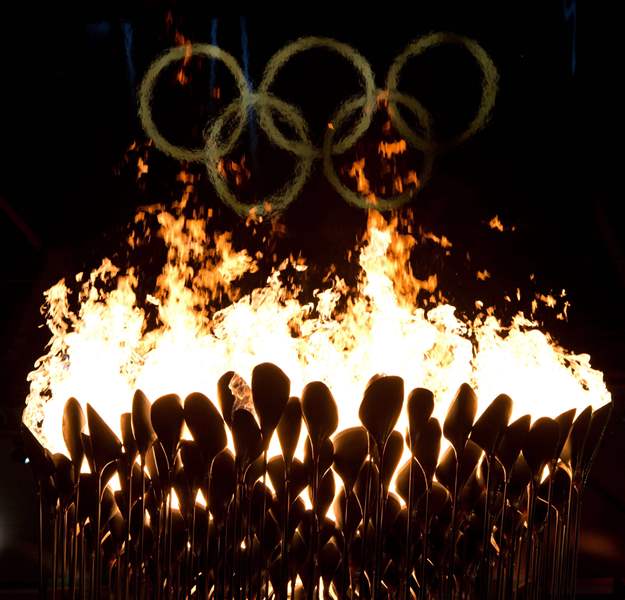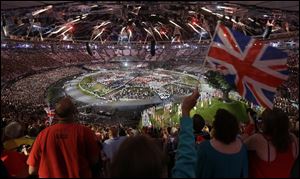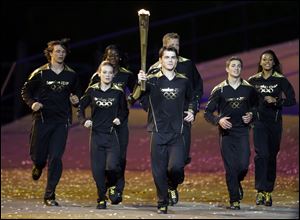
Panorama of delights, from Bond to heroic nannies, opens games
7/28/2012
The Olympic cauldron burns following the opening ceremonies to the 2012 Summer Olympics in London on Saturday.
ASSOCIATED PRESS

A spectator waves the Union Jack as fireworks light the sky over the Olympic Stadium. The city of London put on a 3-hour, 45-minute performance Friday night at a cost of about $42.5 million.
LONDON -- So, when exactly did the Olympic Games begin?
Was it when a video aired on the big screens above Olympic Stadium featuring actor Daniel Craig in his role as James Bond, escorting Queen Elizabeth II out of Buckingham Palace and into a helicopter that was supposedly headed straight for Friday night's opening ceremony?
Was it later when Voldemort, the villainous wizard who must not be named from British author JK Rowling's Harry Potter series, emerged as a massive black-robed puppet, only to be conquered by 32 umbrella-toting women who were dressed up like Mary Poppins and dropping lightly from the sky?
Photo gallery: 2012 Summer Olympic Games opening ceremony
Or was it when a performance of the theme from Chariots of Fire by the London Symphony Orchestra was interrupted by the realization that British comedian Rowan Atkinson, most celebrated for his work as silent character Mr. Bean, was hidden within the orchestra at a keyboard?
On this night, with an estimated 1 billion people around the world watching, Mr. Bean finished his cameo with some well-placed flatulence. His irreverent toot went right along with the tone of this memorable 3-hour, 45-minute performance -- a display that reportedly cost London 2012 organizers the equivalent of $42.5 million and revealed the Brits as people who are willing to spend money on humor at their own expense.
By the time the 10,000-plus athletes, the talented people who will actually make most of the memories during this 30th Olympiad, walked around the track waving their native flags, the party was already well in swing. And, make no mistake, that's exactly what Friday night was -- a party, a celebration of Great Britain's grand history.

The Olympic torch enters the stadium to light the flame that will burn during the summer games.
Only once before the athletes began marching 80 minutes into the ceremony would one have known the Olympic Games were about to begin. That point came into focus very clearly when out of the fires of a choreographed portrayal of the Industrial Revolution came the uniting of five bright orange rings that sprayed sparks as they clashed in the recently darkened sky.
London became the first city to host three Olympics, and there were plenty of questions about what the city would decide to show the world this time around. The last time, in 1948, London hosted what became known as the Austerity Games because no facilities were built to accommodate the events or the participants in the name of the conservative post-war economy.
More than six decades later, the plan was for these games to be much more about posterity than austerity. Certainly, that was assumed seven years ago when London won this Olympic bid, but a brutal recession has squeezed the city and the country along with the rest of the globe.
Defining moment
So, what would London do? It would try to stay the course, spending a reported $14.5 billion to make these 16 days happen. It would invest in one of its poorest communities by putting the Olympic Park in East London's Stratford area. And Friday night, with hundreds of heads of state and First Lady Michelle Obama and presumptive Republican Presidential candidate Mitt Romney in attendance, London would do its best to calm any fears that it wasn't ready for this defining moment.
"For every Briton, just as the competitors, this is our time," said Sebastian Coe, the chair of LOCOG, the London Organizing Committee of the Olympic and Paralympic Games. "And one day we will tell our children and our grandchildren that when our time came, we did it right. Let us determine, all of us, all over the world, that London 2012 will see the very best of us."
A volunteer cast of 7,500 representing every nation did its part, with each person practicing an average of 150 hours, and there was enough staging equipment to stretch 12 Olympic-sized swimming pools. Today, American swimmers Michael Phelps and Ryan Lochte will only need one pool to duel in the finals of 400-meter individual medley -- the first big event of the Olympics.
Swimming will grab the most headlines because of Phelps' quest for 17 career gold medals, which would give him the all-time record, but the London Games officially began Friday morning as archery competition quietly started at the Lord's Cricket Ground in London's St. John's Wood district.
Visitors' impressions
A few blocks away from the Lord's Cricket Ground, tourists gathered at Abbey Road Studios, where The Beatles made records that helped to change music forever. Some of those tourists came here for the Olympics, and, as of Friday afternoon, they weren't feeling much of a buzz.
Ernie and Jeanne Peterson of Deland, Fla., were volunteers at the 1996 Atlanta Summer Games, the 2002 Salt Lake City Winter Games, and the 1996 Torino Winter Olympics, and this just hasn't felt the same.
"This doesn't even begin to compare," Mr. Peterson said. "Very low-key. The other ones, they were just engulfed with the Olympics."
Mrs. Peterson offered a theory as to why.
"We had a British lady tell us last night, 'It takes a lot to get us worked up,' " she said.
Richard Jones, a native of Bristol, England, brought his family to the Olympics this weekend and also ended up on Abbey Road at the historic crosswalk. He said he knows that his countrymen can come off as aloof sometimes, but, trust him, people are excited all over the United Kingdom.
"We're quite reserved," Mr. Jones said, "but when it actually comes to it, we let our hair down and have a bit of fun."
Mr. Jones and his friend, Conrad Meyer, were going to watch the opening ceremony on TV and toast with a bottle of 1963 Port wine.
Security efforts
Yes, the Olympics are finally here. You could observe that on Friday at, of all places, the town home of Sir Paul McCartney, which sits one block away from Lord's Cricket Ground on Cavendish Avenue. Two policemen patrolled the street, carrying semi-automatic weapons and questioning anybody who lingered about their business.
While Friday came and went without incident, the question of security will linger each day of these games. Still, the opening ceremony played a harmonious tune.

The Olympic cauldron burns following the opening ceremonies to the 2012 Summer Olympics in London on Saturday.
More than an hour before it went live, around 9 p.m. local time, the crowd began doing "the wave," cheering as it circled Olympic Stadium.
At the beginning of the show, five Olympic rings were launched into the sky, carried by four balloons. By the end of the ceremony, the rings had reached the stratosphere, and a view of Earth from the rings flashed on the big screens.
Later, British scientist and Londoner Sir Tim Berners-Lee, credited with inventing the World Wide Web, sat at a computer in the stadium and reminded the crowd of the night's theme, "This Is For Everyone."
The ceremony closed with British star soccer player David Beckham delivering the Olympic torch, which traveled 12,800 miles, on a speedboat along the Thames River to a dock near the stadium. The large flame would soon occupy its rightful spot in the middle of the stadium as flashbulbs lit up the building.
The evening wouldn't have been complete without one final show of British celebrity power. For the grand finale, ex-Beatle McCartney took the stage and led the 80,000 people, many of whom spent thousands of their country's currency to share this experience, in the singing of "Hey Jude."
The Block News Alliance consists of The Blade and the Pittsburgh Post-Gazette. J. Brady McCollough is a reporter for the Post-Gazette.
Contact J. Brady McCollough at: bmccollough@post-gazette.com, or on Twitter @BradyMcCollough.